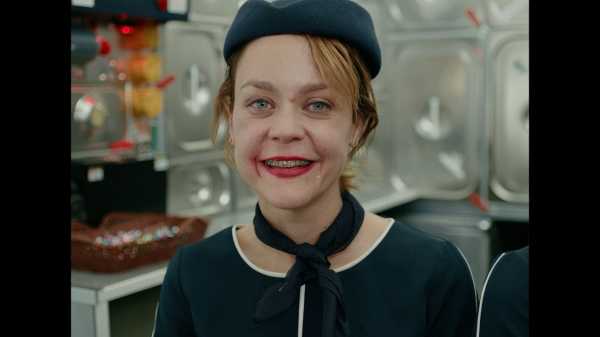
Save this storySave this storySave this storySave this story
In the catalogue of common nightmares, teeth provide some of the most potent imagery. Primal to our mechanisms of speech and sustenance, they also embody a certain vulnerability, anxiety; memento mori, the nearest thing to our own skulls most of us ever see. Carl Jung claimed that, symbolically, losing teeth indicates a loss of “grip,” or control, “a fear of death or a somewhat dangerous communication with the unconscious.” This analysis, approaching but never naming the diagnosis of “hysteria,” connects dental disquiet with maternity and aging—threats, supposedly, to “psychic continuity.”
It makes a kind of sense, then, that the idea for the unnerving short film “AIRHOSTESS-737” came to its creator, Thanasis Neofotistos, in a dream. The film’s protagonist, Vanina, struggles to perform her job as a flight attendant while enduring the pain and perceived humiliation of adult braces. Her discomfort is all the more palpable for her efforts to conceal it beneath red lipstick, a bright expression, coiffed hair, and a pressed uniform; she’s the picture of professionally hospitable femininity, except that something is—off. Cheery music plays while she performs her work, the camera tightly fixed on her face, other characters mere shadows, interlopers, hovering at or just outside the edges of the frame. She demonstrates safety protocols, distributes snacks to passengers, and chats with a colleague, eventually revealing that her braces aren’t the only problem; she and the plane are both carrying some extra cargo (emotional, in her case) that cannot be easily stowed away. As Vanina’s agitation heightens, so does the air turbulence, finally forcing her to confront her trauma surrounding the death of her mother, who abandoned Vanina as a child.
Neofotistos considers “AIRHOSTESS-737” the last installment of a trilogy that also includes his shorts “Patision Avenue,” in which a woman’s parental responsibilities and career aspirations clash, and “Route-3,” about a shy teen-ager afraid to act on his attraction to a fellow tram rider. All three films focus closely, almost claustrophobically, on single characters who are in transit and somewhat at the mercy of their environments; their internal conflicts culminate in moments of sensory overload, setting merging with subconscious to hallucinatory effect. Neofotistos told me that he sees each of these films as following a monomythic narrative structure—an adventure into the unknown, a victory or revelation, and a return bearing newly gained insight or power—and that, together, they represent his own artistic coming of age, his own personal hero’s journey. He identifies especially with Vanina—her craving for maternal love, her experience of repression. For Neofotistos, who is gay and grew up navigating conservative societal expectations in his native Greece, making “AIRHOSTESS-737” felt like a necessary act of acceptance and reconciliation, with his mom and with himself—the end of one chapter and the beginning of another.
That hard-won peace shines through the film’s closing scene: its phantasmagoric climax, which reads as both a brush with death and a rebirth, leaves Vanina dishevelled, appearing finally at ease. She looks directly into the camera and, for the first time, really smiles.
Sourse: newyorker.com






